What it's like to go Scuba Diving
Nov 12, 2014
I took my first breaths underwater in May of 2006 when backpacking through a part of Thailand. I remember being a little nervous and wondering if I’d like it. I was worried about all the normal things new divers worry about. Will it hurt my ears? How long will this tank last underwater and what if I run out? What if I encounter Jaws and he tries to eat me? The list goes on but after my first dive, I was completely hooked. Scuba Diving was for me.
So what makes it so great? Well, the answer is different for everyone but for me, it’s the immediate feeling of relaxation I get when I descend below the surface and find myself on another world surrounded my beautiful creatures. Underwater, you move differently and more slowly, you see and hear different things and you feel relaxed. You also get go somewhere that relatively few humans have ever been.
Lots of people dive actually; estimates are fuzzy but a mere 1.5 million people dive worldwide. Sure that’s a bug number and I have no idea how accurate that estimate is but, considering that there are roughly 7.2 billion people on the planet, this estimate would mean that 0.02% of the world’s population experiences the underwater world. That’s pretty awesome given that water covers 71% of our planet. It’s as if most of our planet is only available to a select few. Pretty cool if you ask me.
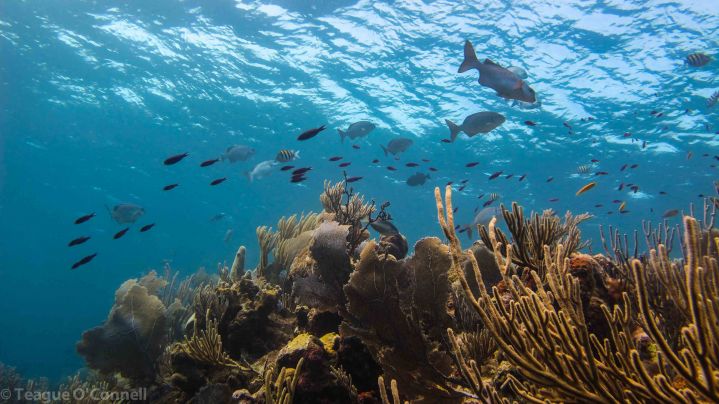 |
| Above: A view of the reef teeming with life. |
What is it like to Scuba Dive? My description will not give you a true feel for the experience but I’ll do my best.
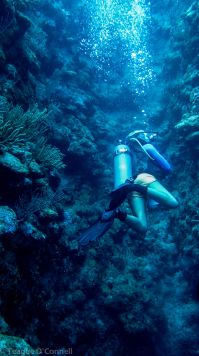 |
| Above: Lydia van Vlijmen |
Most people will describe Scuba Diving as giving you the feeling of weightlessness. To some degree I suppose it feels that way but for me, it’s more like flying through the air like a slow moving hummingbird. You can go forwards and backwards, up and down, and side to side rolling and pitching yourself in all sorts of ways allowing you to fly through spaces and peer into tiny crevices. With practice, you can simply remain motionless in the water and use tiny hand and fin movements to adjust your position ever so slightly. It is like nothing you have ever experienced.
You see heaps of different things underwater. What you see depends on where you are, the time of day or night, your depth, etc. Think of it like being on land, if you go to Africa you’re probably going to see different things than you would see in Australia, Alaska, or in the Amazon. Think of the underwater world the same way. Diving in the cold waters of Canada you will see something completely different than in the warmer waters of the Caribbean. Put simply, however, you will see fish, plants, hard and soft corals, invertebrates like sea stars, jellyfish, lobsters, crabs and different types of worms. If you’re lucky, you’ll see aquatic mammals and larger marine life like stingrays, sharks, eels, and other incredible creatures.
“You said sharks, I’m afraid of sharks…” Don’t be. There are plenty of things far more dangerous to humans than sharks; bees, coconuts, hippos and vending machines just to name a few. This doesn’t stop you from getting snacks, going outdoors, or lounging under the palms at a resort does it? No, probably not.
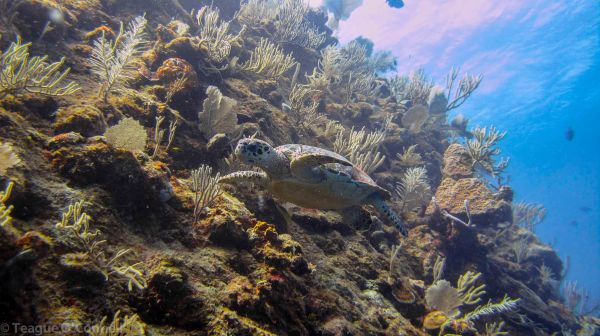 |
| Above: A turtle at Black Coral Wall Utila, Honduras. |
Sound is also different underwater. It travels much faster and much further. You might hear Dolphins or a boat 1 Kilometer away that, to your ears made for the surface, sound like they are directly above you. If you’re diving a coral reef, you’ll probably hear the constant snapping and crackling of fish eating bits of coral and scraping algae off rocks and the reef it self. You’ll also hear the sound of your breathing as air is delivered to your regulator (the thing you breath from) and as you exhale hearing your bubbles float to the surface. At times, there will also be silence.
Can I try it out? Of course! Look, no one is going to force you to dive and there’s no shame in saying “I don’t like this, thanks but no thanks.” But how will you ever know if you don’t try it? In fact, I’d fully recommend trying it out before you commit to getting certified at all. That’s what I did and it took about 5 minutes for me to realize I was going to become a diver. Trying scuba diving is pretty cheap and requires little training. A professional leads the way, handles most of the technical work and provides safety allowing you to take in and enjoy the experience.
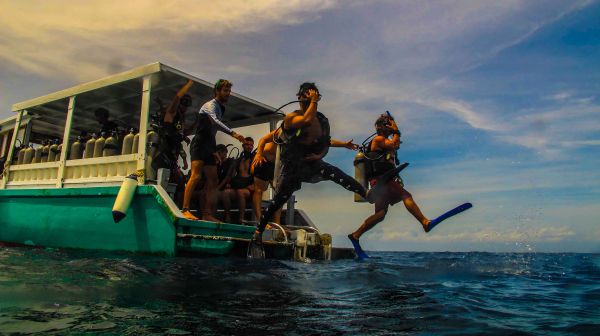 |
| Above: Divers in training entering the water using a Giant Stride. |
Lastly, let me just spend another moment talking about fear. Many people refrain from diving because they are afraid of the water. They love swimming pools but are skeptical of lakes and don’t like going into the ocean beyond where they can stand. Most commonly I hear people say “I’m afraid of the open water where I can’t see and/or touch the bottom.” In my opinion, those are normal fears that come from the unknown and your perception of the water. Imagine for a moment that you were dropped off in 18 meters (60 feet) of water where you can barely see the bottom and are a kilometer from shore, what would run through your head? Probably something like this… “Holy shit, what’s down there? Will it hurt me? If it tries to, can I get away quickly? What if I can’t get away? Oh god, I think I saw a fin!” Diving allows you to see what is down there and in my opinion, makes open water seem more three-dimensional. In other words, instead of being confined to the surface where you have one plane in which to move, like an ant crawling across a sheet of paper, you now have far more freedom to move in many more directions. This does a lot to subdue the fears. You feel less at the mercy of your surroundings and can interact with them in ways you can’t on land. After only a few dives, even the most fearful people become comfortable and feel peaceful and relaxed in and under the water. Trust me on this one, I’ve seen people go from panic and insecurity on their first dive to competent, confident and at home in the water after only 3 or 4 dives. The transformation is so profound that by the time they complete their last dive of their entry-level course, they can’t help but laugh at how silly their fears seem now.
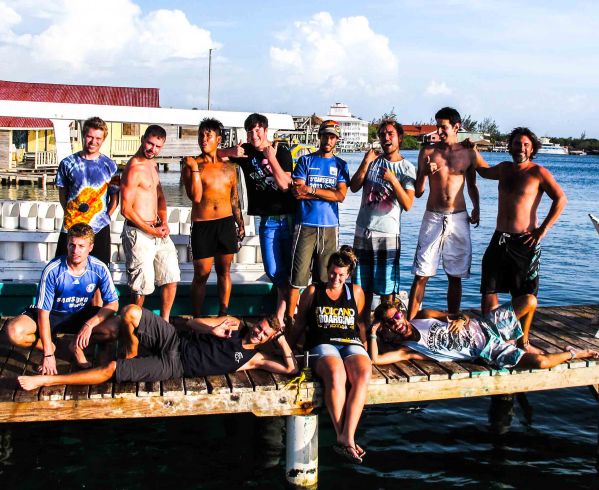 |
| Above: The happy faces of newly certified divers. |
So why did I write this post (more like an advertisement) about scuba diving? Well, because I love it. I love talking to non-divers about diving, especially those who are thinking about doing it for the first time. As a diving instructor, I love seeing someone grow to love it as much as I do. The best part of being a diving professional is watching a person who is afraid of the water overcome their fear and become more comfortable with every breath they take. It’s pretty freakin awesome when a new diver comes to the surface after their very first dive and says “Wow, that was incredible!” If you give it a try, I am certain you’ll have the same response and in all likelihood, you’ll be hooked as well.
|
|
Written by Teague O’Connell Find him on Google | Facebook | Twitter | Instagram
|
Please add a comment
Leave a Reply
Category List
Photo Album (35)
Photo Essays (1)
Accommodations (8)
Places (24)
Food (9)
Products (11)
Activities (11)
Tag List
Career Break (2)
Traveling into Panama (1)
pack, Deuter, Gregory, women (1)
Ecuador (2)
Mini-retirement (1)
Nicaragua (1)
Scuba Diving (1)
Sunday Funday (1)
Central America (2)
Mexico (1)
Salt Flats (2)
Hiking (2)
Travel Workout (1)
Tulum (1)
Family (2)
Biking (1)
birth control and traveling (1)
RTW Travel (9)
Stretch your money (1)
Living abroad (1)
birth control (1)
Travel (4)
Utila (3)
Flores (1)
Belize (1)
Waterfalls (1)
RTW travel for women (4)
Caye Caulker (1)
Costa Rica (1)
Bolivia (2)
Panama (2)
Hostels (4)
Guatemala (1)
Recommendations (2)
Planning Your Trip (1)
Budgeting for travel (1)
Cotopaxi (1)
Tours (2)
Tulum Ruins (1)


